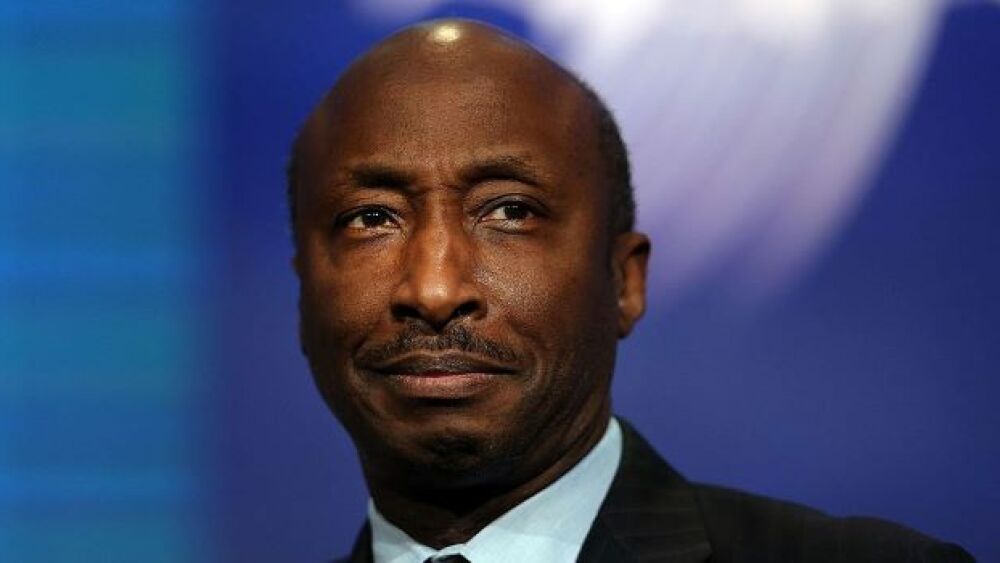Merck Chief Executive Officer Kenneth Frazier has been named CEO of the Year by Chief Executive magazine for his longtime leadership at the pharmaceutical giant.
Spencer Platt/Getty Images
Merck Chief Executive Officer Kenneth Frazier has been named CEO of the Year by Chief Executive magazine for his longtime leadership at the pharmaceutical giant.
Frazier, who will retire from his role at Merck at the end of June, was selected for the honor by an independent committee, Black Enterprise reported. He was tapped for his leadership skills that have guided the company and expanded its influence in oncology, particularly with the powerhouse checkpoint inhibitor Keytruda and his influence in developing the company’s discovery research programs. In addition to his guidance of Merck, Frazier was also selected CEO of the Year for his devotion to social justice and economic inclusion.
Frazier is co-founder and co-chair of OneTen, a faction of leading organizations committed to upskilling, hiring, and promoting one million Black Americans into family-sustaining jobs.
Merck’s CEO has received multiple accolades for his advocacy, including the Anti-Defamation League Courage Against Hate Award, the Botwinick Prize in Business Ethics from Columbia Business School, the Legend in Leadership Award from the Yale School of Management, the NAACP Legal Defense and Educational Fund National Equal Justice Award, and the National Minority Quality Forum’s Lifetime Achievement Award.
In 2018, Frazier was named one of the World’s Greatest Leaders by Fortune Magazine and was named to the Time 100 Most Influential People. In 2019, he became the first recipient of the Forbes Lifetime Achievement Award for Healthcare.
Frazier is one of the highest-profile African American CEOS in the pharma industry and the United States. He was the first African-American to lead a Fortune 500 company. He has been with Merck since 1992, when he joined the company as vice president, general counsel, and secretary of the Astra Merck group.
Throughout his career, Frazier has held multiple leadership roles within the company. He became CEO in 2011.
One legacy Frazier may leave with Merck is a new look at hiring practices. Frazier recently participated in a roundtable discussion regarding the need for four-year degrees. Frazier and the other CEOs suggested companies may benefit by looking past college diplomas and hire workers who can be easily trained to take on new roles.
Frazier said many people had not had an opportunity to go to college due to financial hardships or other obstacles in their lives.
“It’s really important for us to recognize that because people haven’t had an opportunity early in their lives, it doesn’t mean that they can’t make a real contribution to your company,” Frazier said, the Wall Street Journal reported.
“We want to just recognize that, in some ways, this is a harder population, but, at the same time, if we’re committed to being the kind of country that we want to be, then this is something that business has to be willing to do.”
When Frazier departs from Merck, he will be replaced by Robert M. Davis, Merck’s chief financial officer and head of global services. A new CEO typically causes a shakeup at the C-suite level, and Merck will be no exception. There have already been a few changes, including the departure of Michael T. Nally, the chief marketing officer for the Human Health division. Nally left the company at the end of March.
Merck veteran Roger Perlmutter, who helmed Merck Research Laboratories, also departed the company ahead of Frazier’s retirement. Perlmutter left the pharma giant at the end of 2020 and is now CEO of drug discovery startup Eikon Therapeutics, Inc.
Frank Clyburn, current chief commercial officer of Human Health, will become president of the Human Health division and lead all commercial and marketing responsibilities for the business unit.
When Davis transitions from the CFO role, he will be replaced by Merck Treasurer Caroline Litchfield. This week, Davis and Litchfield sat down with a group of Wall Street analysts to outline some potential strategies to streamline the company over the next few years.
The two executives signaled they want Merck to become more portfolio-driven and change how the company pursues research and development and addresses patients, Cowen & Co.’s Steve Scala said.
As can be expected, Keytruda will continue to feature heavily in Merck’s future oncology pipeline. The company anticipates that current and future approvals of Keytruda will be significant revenue drivers for the company.
Additionally, Scala noted that Davis and Litchfield are focused on expanding the company’s roles in vaccines, particularly its HPV drug, Gardasil. The company wants to increase the vaccine supply and have it more widely available across the globe.





